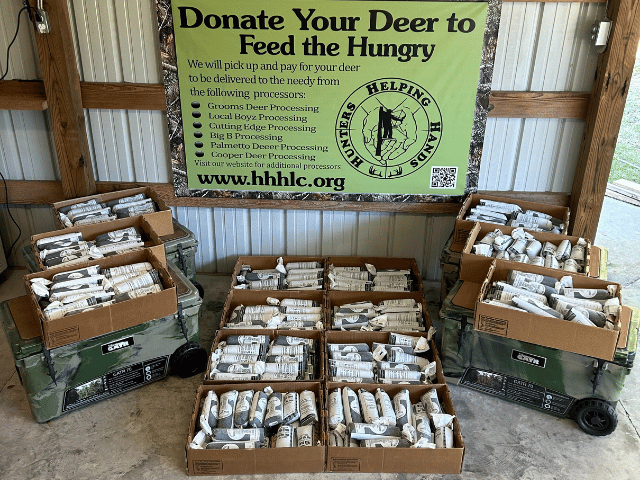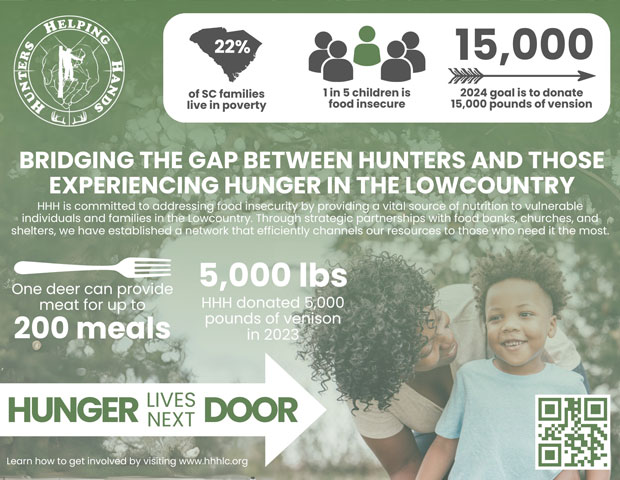When most people think about the challenges and solutions associated with hunger and lack of nutritious food, their first thought is often community gardening or donating canned goods. Many of us don’t think about sources high in protein like meat? An organization of avid deer hunters in Dorchester County is helping to fill the need for meat through a network of deer processors and hunters.

Pete and Lori Singletary founded Hunters Helping Hands in 2022 after retiring. Knowing they wanted to give back to their community, they found inspiration from many of Pete’s hunting excursions in the Midwest where there are state-funded programs that allow hunters to donate their harvest. Their mission is to provide high-quality, nutritious food to families and individuals in need by focusing on sourcing and distributing venison, and Wholespire is supporting their work with a mini-grant.
Often referred to as deer meat, venison is a valuable source of protein and rich in nutrients, but it’s often scarce in the diets of food-insecure families. Getting your hands on venison can be challenging, unless you know hunters. Thanks to Hunters Helping Hands, food-insecure families in the Lowcountry have a way to get one of the most valued sources of protein in their diets.
The organization’s process involves a network of partners, mainly meat processors to prepare the venison and spread the word to hunters about donating their harvest, and food banks, food ministries, and other agencies and nonprofits to distribute the venison to families in need. It’s a process that started out slowly but has grown quickly over two years.
“The first year we picked up 32 deer. So far this year, we’ve picked up about 280 deer. We give out 500-600 pounds of venison per week,” said Pete. “Right now, we’re continuing to grow and get help from people like you, and we certainly appreciate it. This is God opening the doors, and we’re going with it.”
Those are significant numbers indicating a large demand for donated meat in the Lowcountry. According to their HEAL Mini-Grant application, each pound of venison provides approximately five meals, making a significant impact on the families they serve. They’re currently working with 17 food banks, and the list of meat processors is growing, which means the potential of getting even more venison donations during deer season is very real.

“Our goal for 2024 is to process 15,000 pounds of venison, which will generate up to 75,000 meals. It’s an ambitious target, but it underscores our commitment to scaling our operations and reaching more families in need,” said Pete.
Their commitment is solid. One hundred percent of all donations and grants received covers the meat processing fees. All administrative costs of doing business come out of their pockets, as well as their Board of Directors’ pockets. They rely on volunteers to help pick up and deliver donations, take on staff roles, and pitch in when help is needed. All of their children, grandchildren, and their own siblings are heavily involved in the organization.
“A true blessing is giving and not receiving. That’s the way we look at it,” said Pete. “This has been an eye-opening experience. We’re just growing and growing. More and more meat processors are hearing about us and they want to join our efforts, so I need to make sure we have the funding to pay the processing fees and buy equipment to store the venison.”
Pete explained their very simple operating system. During deer hunting season (Aug 15-Jan 1), licensed hunters are limited to harvesting ten deer. Pete says that one or two deer can fill up a freezer. So, what is a hunter to do if they want to continue to hunt? Many hunters offer venison to family, friends or neighbors. Through the Hunters Helping Hands network of meat processors, hunters can drop off the deer and choose to pay a small dressing fee. Pete and Lori are notified when the venison is ready for pick-up and volunteers distribute the meat to partnering food banks.
“If you talk to a hunter who donates their deer, they’ll tell you this: it’s a win-win situation for a deer hunter. They can continue to hunt and feel good about helping people in need,” said Pete.
When deer season ends, the organization continues to receive venison from local farmers who experience severe or persistent crop damage because of deer. As Pete explained, hunters and their representatives can hunt deer during the off season with a special permit from the South Carolina Department of Natural Resources. This rule helps sustain the venison donations throughout the year.
“Before we came along, those deer would be destroyed. We picked up 170 deer before the season came in this year that otherwise would have been left in the field and destroyed,” said Pete. “And that’s what a processor in Orangeburg is wanting to do next year. Instead of destroying them, he wants to give them to us.”
Besides fruits and vegetables, protein plays an important role in the diets of everyone. While venison has been an option for generations of families, it is now a “new” healthy protein option for many Lowcountry families in need, thanks to the huge hearts of hunters.
